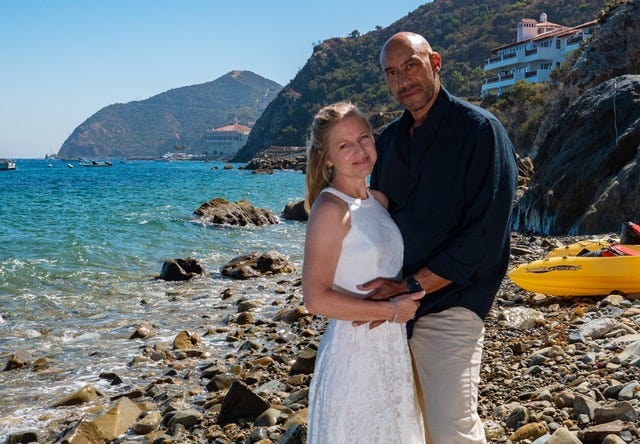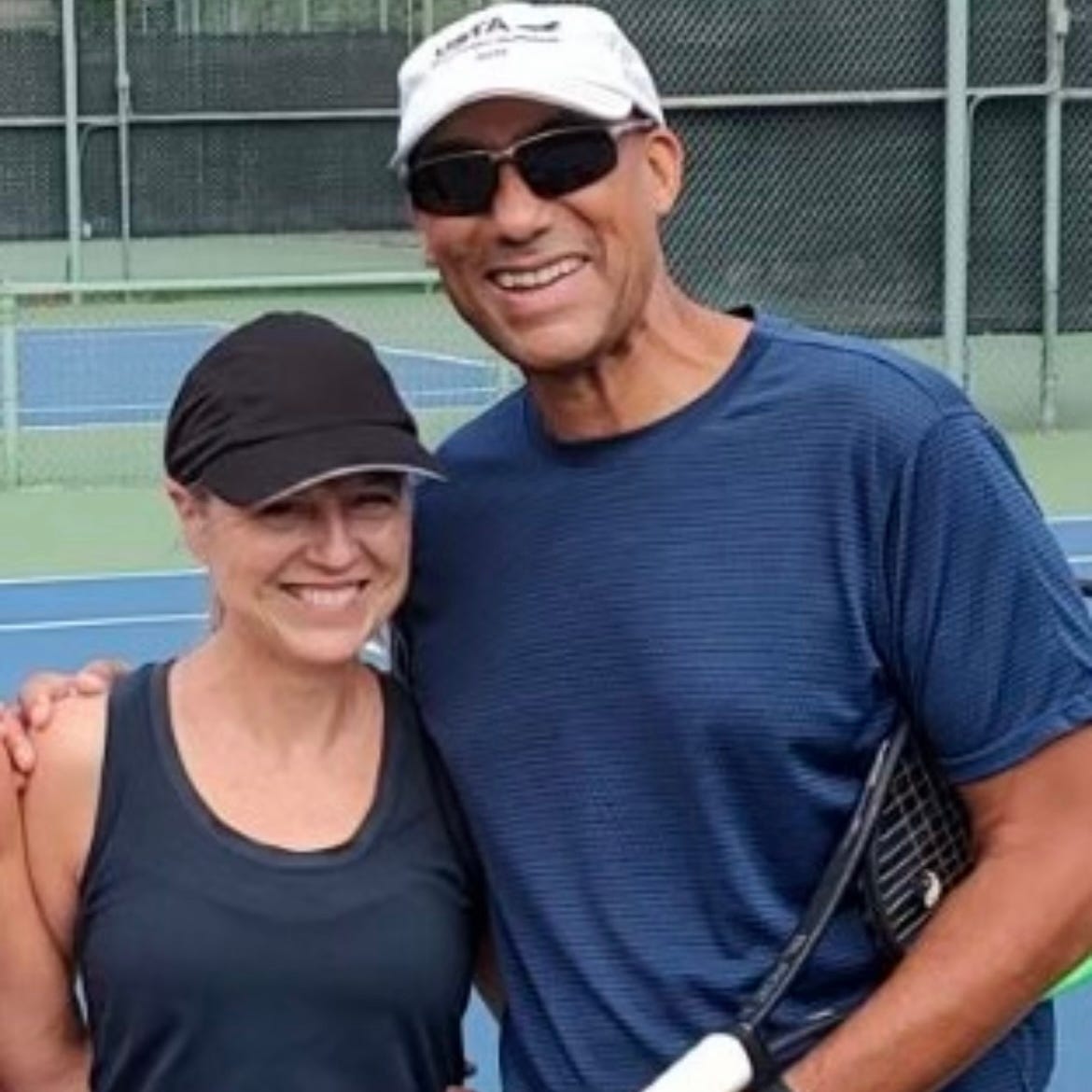By Howard Wolinsky
(Editor’s Note: I am finishing my prost-mitzvah year on Active Surveillance in early December. As I reach 14 years on AS, I can assure you prostate cancer is a “couple’s disease.” I am grateful to my wife Judi who has been a rock in our cancer journey as well as the rest of our journey.
(BTW, we’ve been married three times in past 53 years, including once in the women’s quarters at Machu Picchu. Sixteen years ago, Judi, a soon-to-be certified yoga teacher, and I attended a retreat in Peru’s Sacred Valley. One of our guides, as part of a traditional wedding ceremony, a shaman used a condor wing and bonds made from hat bands I had purchased from a member of the Quechua tribe. It was against Peruvian law to have any ceremony in this national park. So we’re outlaws. The shaman was BMOC in Machu Picchu.
(Our shaman. We were married nearby. —photo by Howard Wolinsky.)
(The shaman counseled each iof us individially after providing a mystic’s tour of Machu Picchu. He warned me in 2008 that I had an impending health challenge: presumably, prostate cancer, which was diagnosed two years later.)
By Howard Wolinsky
Today, I want to share the story of Brenna Humphreys and Steve Royes and their prostate cancer journey. Brenna wrote an article, which appeared in the Los Angeles Times recently.
Steve recently was diagnosed with Gleason 8. Brenna has been Steve’s rock. She is writing a hybrid memoir with Steve about their cancer journey.
They were married on Catalina Island (see below) during the COVID crisis. They kayaked out to the island and changed into their wedding attire.
She wrote: “We traded life vests and bathing suits for wedding attire behind a rock and connected to shaky cell service so family and friends could participate. Then we paddled back, racing to return the kayaks before sundown. That’s what life with Steve is like. There’s no such thing as ‘can’t.’ If I dream it, he gets it done down to the last detail.”
Recently, the couple was hit by a blow—Gleason 8 prostate cancer.
Somehow Steve, 62, had fallen through the cracks: His dad died from prostate cancer. His father was born in Jamaica where prostate cancer is considered an epidemic according to the World Health Organization.
Brenna explains in her essay in the LA Times how opposites can attract and complement each other,
She wrote:: “My instinct is to trust doctors to know more than I do. If they say biopsy, I ask when. Steve rejected the standard biopsy in favor of his own plan, so he’ll need a referral, which will take time. Maybe too much time. The MRI indicated a large tumor that has spread outside of his prostate.
“Prostate cancer is not a death sentence these days, but it’s also not something you put off. .. I shake my head to drive away thoughts of his athletic body deteriorating before my eyes. I know that the side effects of hormone treatment, horrifyingly referred to ‘chemical castration,’ can be permanent.
“It makes me want to freeze this moment. During the call with the doctor, Steve used the pronoun ‘we’ a lot — as in ‘We have prostate cancer’ and ‘We want an MRI-guided biopsy. His eyes met mine more than once, reassuring me that we’re still a team — just like we are on complex video shoots for our business, parenting a blended family and wrangling our 120-pound dog for a bath.”
Brenna Humphreys earned an MFA from Antioch University Los Angeles, and her work has been published in Kelp Journal, Proud to Be, Inman News and others. Find her at her Q.O.L. blog:
Brenna also can be found at brennahumphreys.com and on Instagram: @brennahums.
Revisiting The Bottles.
Don’t miss Dr. Jonathan Epstein’s first patient forum since leaving Hopkins: The Active Surveillor’s ‘AS 25’ webinar
By Howard Wolinsky
Famed uropathologist Jonathan Epstein has kept a low-profile since resigning from Johns Hopkins in February 2024 following a dispute with Hopkins, his professional home for almost 40 years.
Dr. Epstein is in the process of opening a new consultation practice soon in New York City. I will report details on how to reach him soon.
Epstein will be speaking on a panel on what happened in prostate cancer in 2024 and what’s on tap for 2025.
The program is scheduled for noon-1:30 p.m. Eastern on Saturday, January 4, 2025.
The program is free for paid and founding subscribers to TheActiveSurveillor.com. You can subscribe here:
This will be Epstein’s first appearance at a patient forum since April 2023, a program I moderated for Active Surveillance Patients International.
TheActiveSurveillor.com broke the story a month later on the dispute between Dr. Epstein and Hopkins that led to the pathologist’s resignation. TheActiveSurveillor.com and the Washington Post published more details.
I am delighted and honored that Dr. Epstein will join a distinguished panel for AS 2025. I suspect that digital pathology and AI will be among the subjects that will be discussed.
Dr. Epstein has had a major impact on Gleason 6 scoring and creation of the Grade Group system and other areas.
Previously announced panelists are:
—Brian Helfand, MD, PhD, chief of urology at NorthShore University HealthSystem outside Chicago, an expert not only in prostate cancer but also in molecular biology.
—Christian Pavlovich, MD, who runs the Active Surveillance program at Johns Hopkins and recently co-authored a major study on diet.
—Timothy Showalter, MD, MPH, medical director of Artera AI, which has made news with its prostate test to help patients decide whether to go on AS.
Unsolicited testimony
Bill Peck: I love the Active Surveillor ... I was diagnosed with PCa in Sept (3+4 in 2 cores, < 5%). Radiation oncologist said, "When do you want to start?" ... and I was like "Hold on a sec, ok?"
I also found this article which is great and I am sharing with my children:
https://howardwolinsky.substack.com/p/prostate-cancer-treatment-is-not
Thanks, Bill. Glad you’re here,
ASPI presents: How you can help advance research on Active Surveillance
By Howard Wolinsky
Without clinical trials, such as ProtecT, patients with lower-risk prostate cancer would have had no choice other than aggressive treatment with risks of side effects impacting their quality of life. I have participated in about a dozen trials as a patient and a patient researcher.
I highly recommend participation in trials. I have been in studies on diet and low-risk prostate cancer, genetics and medications and low-dose aspirin and preventing heart attacks. You’re paying it forwardcwhen you join in.
Look for trials on Active Surveillance that you potentially can join at ClinicalTrials.gov
Active Surveillance Patients International (ASPI) is holding a webinar at 12:00PM ET Saturday, November 30, entitled “How you can help in clinical research on Active Surveillance.”
REGISTER HERE: https://zoom.us/meeting/register/tJIocOCupz4jGtX8fHJ036bYGHYIjLfwfRzk
Speakers will include Kevin Shee, MD, PhD, a researcher at the University of California, San Francisco, and Mike Scott, founder of Prostate Cancer International and an early advocate for Active Surveillance.
Dr. Shee has been involved in multiple studies, the most recently one on whether men 75 and above should stop active surveillance.
Though not a prostate cancer patient himself, Mike Scott was the founder of one of the first support groups for men on AS. ASPI this year presented him with its 2024 Thráinn Thorvaldsson Award for Patient Advocacy.
A question-and-answer session will follow the presentations.
If you have questions, please send them to: contactus@aspatients.org
Climbing Dr. Geo’s ‘Prostate Cancer Summit,’ addressing AS, herbs, diet, prostate massage, and more
By Howard Wolinsky
Dr. Geo Espinosa (you may know him as the author and podcaster “Dr. Geo,”), the naturopath specializing in prostate care on faculty at New York University, is hosting a free week-long “Prostate Cancer Summit” you shouldn’t miss.
The free event runs November 19 - 25, with an “encore weekend” November 29 - December 1, 2024. Register here: https://drtalks.com/summit/prostate-cancer-summit/?uid=814&oid=83&ref=4266 Dr. Geo is interviewing more than 40 experts on prostate cancer plus me.







I respectfully suggest that ALL cancers are 'couple cancers' based on more than two decades of counselling men with prostate cancer about treatment decisions as well as providing sex therapy to them and their partner. I have also seen multiple individuals with a range of different cancers and I have never seen their partner not be impacted in many different ways.
I suspect that, in part, the notion of prostate cancer being a 'couple's cancer' is due to the assumed role of the man being the sexual initiator so when treatment inevitably causes sexual problems, the partner is negatively impacted due to sexual problems.